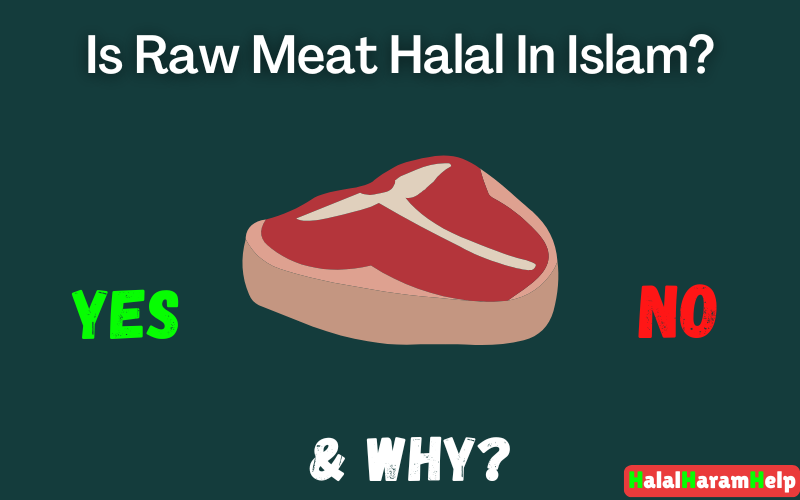Is raw meat halal in Islam? This question often arises for those curious about Islamic dietary laws.
In Islam, food must meet certain conditions to be considered halal, including how it is sourced and prepared.
But what about raw meat? Can Muslims consume it, or does it need to be cooked to be permissible?
This article explores the Islamic perspective on eating raw meat, such as sushi, tartare, or carpaccio, and the guidelines that determine its halal status.
Whether you’re seeking clarity for religious adherence or just curious, we’ll dive into the factors that make raw meat halal or haram.

Is Raw Meat Halal In Islam?
Yes, raw meat is halal in Islam, but only if certain conditions are met.
The meat must come from an animal slaughtered according to Islamic dietary laws (Dhabīḥah), and its consumption should prioritize health and safety.
While permissible, eating raw meat for enjoyment is generally discouraged due to its associated risks.
In this article, we’ll explore when raw meat is allowed, why caution is advised, and the Islamic perspective on its consumption.
You might also like to know is lucid dreaming haram.
When Is Raw Meat Halal?
Raw meat is permissible under Islamic law, but there are specific conditions that must be fulfilled for it to be considered halal:
1. Proper Slaughtering Process (Dhabīḥah):
The animal must be slaughtered according to Islamic guidelines. This involves:
- Cutting the jugular veins, windpipe, and carotid arteries in one clean stroke using a sharp knife.
- Draining all the blood from the animal.
- Reciting Bismillah (In the name of Allah) during the slaughter.
This ensures the meat is halal, whether consumed raw or cooked.
2. Necessity or Survival Situations:
Consuming raw meat is allowed if no other food options are available, such as in emergencies or survival situations.
Islam permits actions that preserve life when there are no viable alternatives, provided the meat meets halal standards.
3. Health and Safety:
If the raw meat is fresh, properly handled, and free from harmful bacteria, its consumption is permissible.
However, Islam’s emphasis on avoiding harm makes eating raw meat a cautious exception rather than a routine practice.
Also see is it haram to eat with left hand.
Why Is Eating Raw Meat Discouraged?
Although raw meat can be halal, Islamic teachings discourage its regular consumption due to the following reasons:
1. Risk of Foodborne Illnesses:
Raw meat often harbors bacteria and parasites that can lead to severe health issues, including:
- Salmonella: A bacterium that causes food poisoning, leading to symptoms like fever, diarrhea, and abdominal cramps.
- E. coli: A harmful bacterium that can cause severe stomach infections.
- Parasites: Certain worms and organisms found in raw meat can lead to long-term health complications.
2. Islam’s Focus on Health:
Islam strongly emphasizes protecting human health and well-being. Consuming raw meat without a valid reason contradicts this principle, as it unnecessarily exposes one to harm.
3. Avoiding Harm for Fun or Entertainment:
Eating raw meat as a novelty or for entertainment purposes is discouraged. Islam teaches moderation and avoiding actions that harm oneself without meaningful justification.
Raw Meat In Cultural Practices
In some cultures, eating raw meat or fish is a long-standing tradition. While cultural practices are respected, Muslims must ensure that the meat or fish consumed adheres to Islamic dietary laws:
1. Raw Fish and Seafood:
Most seafood is halal unless it falls into prohibited categories, such as:
- Predatory sea creatures (e.g., sharks).
- Bottom-feeders that consume impurities (e.g., catfish).
- Dead fish found floating in water (unless the fish naturally dies and remains unspoiled).
2. Sushi And Sashimi:
Sushi, which often includes raw fish, is halal if the fish is from an allowed species, caught using halal methods, and properly handled to prevent contamination.
3. Raw Meat In Other Dishes:
Dishes like steak tartare or carpaccio can only be halal if the meat is slaughtered according to Islamic guidelines. Additionally, they should not contain haram additives, such as alcohol-based marinades or gelatin-based sauces.
Who Can Consume Raw Meat?
While consuming raw meat is generally discouraged, there are situations where it might be permissible:
1. In Survival Scenarios:
When no other food is available, eating raw meat is allowed to sustain life.
2. Medical Reasons:
Individuals with specific health needs may consume raw meat under medical advice, provided it comes from a halal source.
3. Dietary Preferences:
Athletes or individuals following strict diets (e.g., paleo or carnivore diets) may consume raw meat if it meets Islamic guidelines.
In all cases, the meat must be fresh, halal-certified, and handled hygienically.
Precautions For Consuming Raw Meat
If consuming raw meat is unavoidable, it’s essential to follow these precautions:
1. Source Verification:
Ensure the meat comes from a halal-certified source, where the animal was slaughtered according to Islamic laws.
2. Freshness:
The meat should be fresh, properly refrigerated, and free from signs of spoilage.
3. Hygiene:
Handle the meat with care to avoid contamination. Always wash utensils, cutting boards, and hands thoroughly after contact.
4. Consult a Doctor:
If you have health concerns or a compromised immune system, consult a medical professional before consuming raw meat.
5. Avoid Unnecessary Consumption:
Raw meat should only be consumed when necessary, not for casual or experimental purposes.
Also see is soy sauce halal.
Conclusion
In conclusion, raw meat is halal in Islam if it comes from an animal slaughtered according to Islamic guidelines.
However, consuming it is generally discouraged due to health risks like foodborne illnesses and contamination.
Islam emphasizes protecting health and avoiding harm, encouraging Muslims to prioritize safety in their dietary choices.
While raw meat may be permissible in emergencies or under specific conditions, it is always better to cook or process it to ensure its safety.
By adhering to Islamic teachings of care and moderation, Muslims can make informed decisions about their food, prioritizing both faith and well-being.


